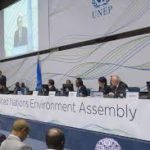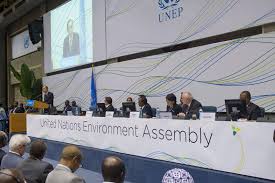By Asma’u Ahmad
The third session of the United Nations Environmental Assembly (UNEA) ended in Nairobi, Kenya with world leaders pledging to end pollution for a clean environment.
Health Reporters gathered that over 4,000 heads of state, ministers, business leaders, UN officials, civil society representatives, activists and celebrities attended the three-day meeting.
 They also agreed on a raft of resolutions and pledged to improve the lives of billions across the globe by cleaning up air, land and water. UNEA outgoing President Edgar Gutierrez-Espeleta, said any threat to the environment, health, economy, security, well-being and survival has to be stopped forthwith.
They also agreed on a raft of resolutions and pledged to improve the lives of billions across the globe by cleaning up air, land and water. UNEA outgoing President Edgar Gutierrez-Espeleta, said any threat to the environment, health, economy, security, well-being and survival has to be stopped forthwith.
“With the promises made here, we are sending a powerful message that we will listen to the science, change the way we consume and produce, and tackle pollution in all its forms across the globe,” said Gutierrez-Espeleta who is also the Minister of Environment and Energy of Costa Rica.
The assembly noted that tackling pollution will enable countries to contribute to sustainable development by fighting poverty, improving health, creating descent jobs and reducing Greenhouse Gas Emissions (GHGs).
They expressed commitment to collaborating with the politicians, scientists, the private sector and civil society to deliver a pollution free planet and also pledged to continue to respect the Rio principles on environmental and development in efforts to make the environment clean.
According to the WHO guidelines for air quality, more than 17,000 people die prematurely due to ill health associated with pollution. Hundreds of children below the age of five die from contaminated water and poor hygiene while women and girls continue to be affected from smoke emanating from fuel wood.
The ministers noted that it is unfortunate that every year 4.8 to 12.7 million tonnes of plastic are dumped in oceans.
The ministers also noted that 40 million tonnes of electronic waste are generated annually and increase every year by four to five percent, causing severe damage to ecosystems, livelihoods and health.
Head of UN Environment Programme, Erik Solheim, said the assembly on Wednesday put the fight against pollution high on the global political agenda. “We have a long struggle ahead of us, but the summit showed there is a real appetite for significant positive change. It isn’t just about the UN and governments, though,” Solheim said.
He said the huge support from civil society, businesses and individuals, with millions of pledges to end pollution, “show that this is a global challenge with a global desire to win this battle together.”
The environment ministers for the first time issued a declaration, calling for the world to honor efforts to prevent, mitigate and manage the pollution of air, land and soil, freshwater, and oceans, which harms health, societies, ecosystems, economies, and security.
The ministers also called on member states to take actions against chemicals that are used in daily lives since they affect communities who do not know the sides they are exposing themselves into.




